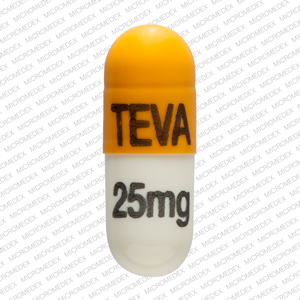Nortriptyline and Alcohol/Food Interactions
There is 1 alcohol/food/lifestyle interaction with nortriptyline.
Nortriptyline Alcohol (Ethanol)
Moderate Drug Interaction
Ask your doctor before using nortriptyline together with ethanol (alcohol), this can alter the effects of nortriptyline and cause increased side effects. Call the doctor if you experience uneven heartbeats, extreme drowsiness, confusion, agitation, vomiting, blurred vision, sweating, muscle stiffness, feeling light-headed, and seizures. You should be warned not to exceed recommended dosages, to avoid alcohol, and to avoid activities requiring mental alertness. If your doctor prescribes these medications together, you may need a dose adjustment to safely take this combination. It is important to tell your doctor about all other medications you use, including vitamins and herbs. Do not stop using any medications without first talking to your doctor.
Switch to professional interaction data
Nortriptyline drug interactions
There are 706 drug interactions with nortriptyline.
Nortriptyline disease interactions
There are 20 disease interactions with nortriptyline which include:
- anticholinergic effects
- cardiovascular disease
- pheochromocytoma
- acute myocardial infarction recovery
- cardiovascular disease
- seizure disorders
- bone marrow suppression
- diabetes
- renal/liver disease
- schizophrenia/bipolar disorder
- tardive dyskinesia
- acute alcohol intoxication
- bipolar disorder screening
- glaucoma
- hyper/hypoglycemia
- liver/renal disease
- neutropenia
- schizophrenia
- thyroid disorders
- urinary retention
More about nortriptyline
- nortriptyline consumer information
- Check interactions
- Compare alternatives
- Pricing & coupons
- Reviews (572)
- Drug images
- Side effects
- Dosage information
- Patient tips
- During pregnancy
- Support group
- Drug class: tricyclic antidepressants
- Breastfeeding
- En español
Related treatment guides
Drug Interaction Classification
| Highly clinically significant. Avoid combinations; the risk of the interaction outweighs the benefit. | |
| Moderately clinically significant. Usually avoid combinations; use it only under special circumstances. | |
| Minimally clinically significant. Minimize risk; assess risk and consider an alternative drug, take steps to circumvent the interaction risk and/or institute a monitoring plan. | |
| No interaction information available. |
See also:
Further information
Always consult your healthcare provider to ensure the information displayed on this page applies to your personal circumstances.


